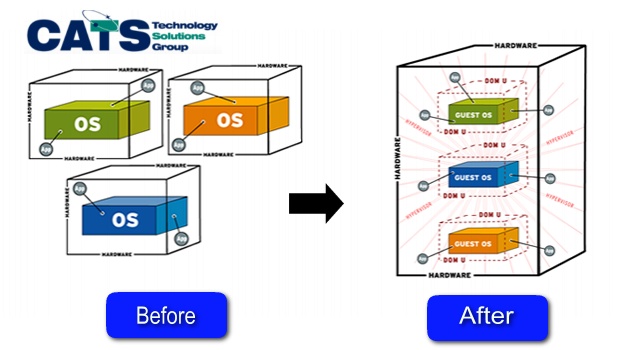Do you have servers that are nearing the end of life?
Do you run custom applications?
Then chances are, you have heard a thing or two about server virtualization.
Server virtualization is the partitioning of a physical server into smaller virtual servers to help maximize your server resources. (1) Through software technology industry is able to get “you more bang for your buck” by reaping more benefits from the same set of IT resources (Servers, SAN, NAS, Etc)
Small to medium size companies have significant investments in IT infrastructure. Properly designed systems need to ensure isolation, business continuity, and scalability. All of these concerns are covered in a well-built systems architecture designed with server virtualization, which can include:
Isolation: Having your servers independent of other each other is critical for any well-built system. Server virtualization achieves this and much more. Perhaps you have an ERP system, or other line of business application that needs to have a Database server, Application Server, and Remote Desktop Server. Under the terms of isolation, these systems will all be “virtual sessions” and never interfere with each other.
Business Continuity: Server virtualization affords a company the ability to have invariable degrees of business continuity. Server virtualization, when built correctly, can provide for global levels of business continuity. Geographic diversity is key for verifiable, audit worthy, business continuity plans.
Scalability: A well-built system is modular in design. Utilizing the latest in technologies, a system can be elastic. It can grow as your data grows. A SAN for example will have upwards of 20 slots for disks. You can start up with only a fraction slots and add more disk as needed. Systems can be added to the “cluster” and more and more processing power can be harnessed. Server virtualization makes this all possible.
Cost savings can be made with respect to adopting virtualization technology as: energy consumption, adding servers without purchasing hardware, and reduced cooling costs.
Additionally, lowered operational costs and IT employees are needed to run a well-engineered environment. Systems maintenance is easier with various management tools available through virtualization software providers.
The conclusion is drawn with an eye towards cost-savings, increased performance, and modularity. Server virtualization makes absolute sense for the small to mid-size company.
(1) http://www.webopedia.com/TERM/S/server_virtualization.html





